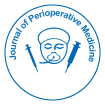
Journal of Perioperative Medicine
Open Access
ISSN: 2684-1290

ISSN: 2684-1290
Editorial - (2021)Volume 4, Issue 6
Obstetric anesthesia is a sub speciality of anesthesiology which provides anesthesia for labor. It is used in C-sections. It is used for pain management for complicated and uncomplicated pregnancies. Its practice may consists largely of managing pain during VAGINAL deliveries and administering anesthesia for C sections however the scope is expanding to involve anesthesia for both material as well as fetal procedures. Caesarean sections are classified into four categories. Grade 1 C-section which is an emergency that means there is a threat to the life of mother or child within 30minutes. Grade 2 is an urgent that means there is a threat to the life of the mother or child within 60minutes. Grade 3 is also called Scheduled which means there is a need of delivery within 24hours. Grade 4 is elective which is just like a schedule surgery but no urgency or deadline to do C-section. As the mother want to opt a surgery for delivery she goes for elective with the approval of doctor. During C-section there is no pain as the area from the waist to below is numbed using anesthesia which generally is an epidural or spinal block. A C-section can lower the risk of birth injuries such as oxygen deprivation, shoulder dystocia and other fractures. And one important point to make note of is that experts do not recommend more than 3 C-sections for any patient. A whole procedure of C-section lasts from 10-30minutes. There are 5layers that need to get through before surgeons get to the uterus.
Material fetal medicine (MFM), also called as Perinatology focuses on managing health concerns of the mother and the fetus before and after the child birth. They help to take care of the health of both mother and the child. Specialists help mother prepare for any complications or health concerns during pregnancy. Thus a specialist in obstetrics can help the mother and child care before and after the delivery.
Preopearive measures of Caesarean include taking plenty of water until 2hours of the surgery, do not take any solid foods before 8hours of the surgery, do not shave your stomach or the vaginal area, discuss pain management and do not panic.
As C-section is a major surgery, you need to take a lot of rest. After a C-section you will be discharged 3-4days after the surgery. You need to rest for at least 6weeks for your body to heal. To heal your body completely you need to rest, walk everyday as it helps prevent the blood clots and constipation. Hold a pillow near your incision when you need to cough or laugh, drinking plenty of water and taking food that is rich in fibre. Things you should avoid doing are lifting heavy weights, using tampons, taking baths until the incisions are healed, doing vigorous exercises, having sex and also taking stairs. If the doctors used any tape strips allow them to fall off on their own and do not try to remove them.
You can consult with your doctor if it is hard for you to breathe, or have fever more than 104°F, vaginal bleeding gets worse, severe thigh pain or calves pain, incisions comes open and in case of nausea or vomiting.
Received: 08-Nov-2021 Accepted: 22-Nov-2021 Published: 29-Nov-2021
Copyright: This is an open access article distributed under the terms of the Creative Commons Attribution License, which permits unrestricted use, distribution, and reproduction in any medium, provided the original work is properly cited.